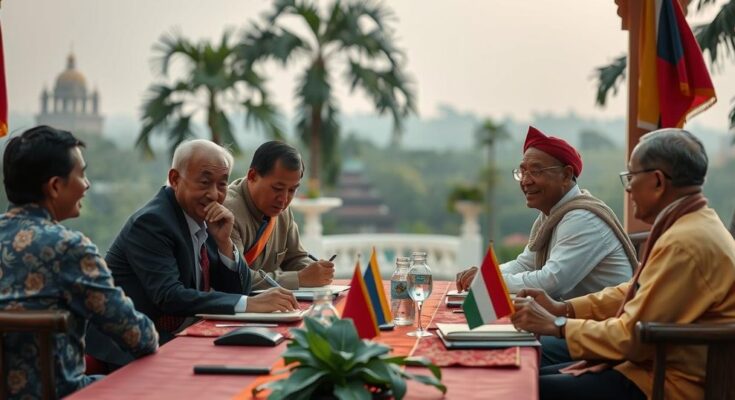In Myanmar, Joseph Kung Za Hmung calls for urgent dialogue to mediate the civil war, highlighting the need to end military violence against civilians. Appointed to the National Human Rights Commission, Kung aims to foster communication between conflicting groups and support ceasefire initiatives. Regional leaders and church authorities echo the calls for peace, emphasizing the necessity for reconciliation amid ongoing turmoil and humanitarian needs.
In Myanmar, Joseph Kung Za Hmung, a Catholic educator and founder of St. Joseph University, emphasizes the urgent need for dialogue to mediate the ongoing civil war. He notes that ending military violence against civilians is crucial for the country’s future, which is at risk of collapse without educational and healthcare foundations. As a newly appointed member of the Myanmar National Human Rights Commission, Kung intends to facilitate communication between conflicting parties and push for peace negotiations. Following a recent reassessment, the military junta renewed the commission’s eleven members, mainly from civil society, positioning them as independent observers. This group is tasked with recognizing human rights abuses and initiating dialogue among diverse factions, including the military and various ethnic militias. Kung highlights the critical need for a ceasefire as many civilians suffer from escalating violence and displacement. The urgency for dialogue has also been echoed by regional leaders in ASEAN during their latest summit, proposing a peace conference for resolving the crisis. Cardinal Charles Maung Bo, Archbishop of Yangon, expressed his deep concern and hope for reconciliation, emphasizing the importance of finding a peaceful resolution to the conflict through dialogue. The reformed National Human Rights Commission recently inspected a Yangon prison housing 12,000 inmates, addressing severe conditions and advocating for humane treatment of both ordinary and political prisoners. Notably, many Rohingya inmates remain incarcerated despite completing their sentences due to the ongoing unrest in Arakan. The commission recommended including political prisoners in upcoming amnesties, seeking to balance justice with compassion in a strained political landscape.
The ongoing civil war in Myanmar has drawn widespread concern due to the brutal treatment of civilians by the military junta and the escalating humanitarian crisis. Joseph Kung Za Hmung, a significant voice within this crisis, aims to initiate dialogue as a representative in the National Human Rights Commission. His role reflects a growing recognition of the need for peaceful negotiations amid complex layers of military control and local militias that dominate much of the country. The international community, as well as regional organizations like ASEAN, are advocating for dialogues and peace talks to restore stability, highlighting the pressing need for a ceasefire to protect the vulnerable population and address the rising number of internally displaced persons.
The appeal for dialogue in Myanmar’s civil conflict underscores the urgent need for peaceful resolutions. As military actions continue to affect civilians, the newly constituted National Human Rights Commission strives to facilitate communication and advocacy for humane treatment in prisons. Various stakeholders, including church leaders and regional bodies, are uniting efforts to encourage negotiations, highlighting a collective yearning for peace and a swift end to the ongoing suffering of the civilian population.
Original Source: www.fides.org



